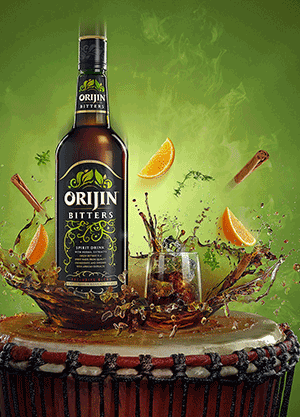The launch of Orijin Ready-To-Drink (RTD) bitter variants early this year by Guinness Nigeria has thrown the RTD and bitter segment of the fast moving consumer goods (FMCG) into a frenzy.
Guinness Origin drink
But, going by antecedents, there is no guarantee that the aura with which Orijin entered the market will last.
Market value
The bitters beverage market, estimated at over N32.2 billion ($200 million) yearly, has suddenly been discovered as another investment slot with bigger players tapping throwing their hats into the ring.
According to Country Manager of Kasapreko, Jose Roque, the Nigerian market for Alomo Bitters alone is over 50 per cent of the entire Kasapreko business in West Africa.
“If you look at Africa, anyone who does not see the Nigerian market is really blind. You can’t miss Nigeria; it is a powerhouse in Africa. From the GDP stand point and population, Nigeria is the largest economy in Africa,” Roque said.
Growing influence
The growing popularity of herbal mixture beverage started in Accra when Kasapreko from Ghana introduced Alooma Bitters.
What was seen as herbal cleansing for women during ovulation later turned into a street drink heavily patronised by folks.
The popularity led to the introduction of other brands such as Action Bitters, Osomo (by Yem-Kem), Pasa Bitters, Sapiro (Yoyo Bitters) and Agya Appiah Bitters (Ghana).
The bitters originated from herbs which contain body purifiers, anti-malaria components and ingredients for male virility.
Analysts said the market is growing because consumers have switched to special drinks.
Orijin enters
Guinness Nigeria is the latest company to exploit the market with Orijin, and has been engaging in a lot of activities to shore up dwindling volume of some established brands.
The marketing of Orijin is one of those activities.
The brand, which seems to lack parentage – unlike Foreign Extra Stout, Guinness Extra Smooth, Harp, Malta Guinness, Snapp and Smirnoff, among others from the Diageo stable – joined Dubic, Alvaro and Harp Lime.
Guinness Nigeria Corporate Relations Director, Sesan Sobowale, said Orijin is targeted at traditional yet progressive Africans who desire world class brands and experience that align with African pride and heritage.
“Orijin is a brand that celebrates the vibrant culture of modern Africa. Herbs have been part of life in Africa for centuries and remain relevant today. Orijin has taken herbs and fruits and evolved them into a modern brand for today’s world,” he explained.
No identity
Despite a lack of clear identity, Orijin (which Guinness says is not beer or bitter), continues to gain mileage in Lagos.
A senior Guinness official confided that declining volume in most premium brands necessitated the introduction of Orijin.
But Sobowale countered that “Orijin is indeed a Diageo brand which is marketed only in Nigeria for now. It is a proudly Nigerian and African brand within the iconic and adored Diageo portfolio. Our understanding is that other Diageo markets will follow suit soon.”
Mixture and beer variant
Not only did Guinness launch bitters variant to compete with numerous similar brands, it also introduced RTD variant, which many consumers refer to as a ‘beer’. But why should a herb flavoured drink come as a beer?
Sobowale said Orijin is a trademark name that cuts across RTD and bitters and was not developed as a beer. “It is not correct to refer to it as a beer variant. It is not a beer,” he insisted.
Orijin is not a herbal mixture, either. According to Sobowale, it is a bittersweet blend with flavours of African herbs and fruit – taking the culture of herbal drinks in Africa and updating it for today’s world.
“We produce Orijin Ready-To-Drink (RTD) and Bitters. Orijin bitters is a herbal spirits while Orijin RTD is similar to spirits and wine but is good-tasting and has lower alcohol.
“It is also not correct to refer to it as ‘beer variant’. It is not a beer,” he maintained.
Gordon Spark replacement
But Orijin is going through a crisis of segmentation and differentiation as consumers see it as a ‘beer’ product.
Observers argue that it was introduced to fill the vacuum created by the disappearance of Gordon Spark, an RTD drink rested by Guinness Nigeria a few years ago as a result of poor sales.
Sustenance
Guinness Nigeria has introduced at least five new brands since Seni Adetu became Managing Director. They are Dubic, Snapp, Alvaro, Harp Lime, and now Orijin.
The first four brands hardly command shelf or bar presence. Apart from failure to empower new products to compete, some line extended brands and established ones, such as Gordon Spark and Satzenbrau, lack the spark to thrive.
The apprehension in some quarters is that Orijin may go the same way.
Alvaro, launched to rival Fayrouz (produced by Nigerian Breweries) does not challenge the market leader and also fails in terms of market share and top of the mind.
Smirnoff, apparently the only RTD in Guinness Nigeria’s ‘palmy’ category, has failed to dominate.
Satzenbrau, Harp Lime, tactical marketing blunders from the brand owners, have also fallen flat in the face of no competition.
However, Sobowale dismissed the apprehension about Orijin.
He said there is a hold on production of Gordon Spark and Harp Lime but Satzenbrau is a thriving value brand with sales volumes more than double in the first half this year alone.
Orijin will not die, he predicted.




